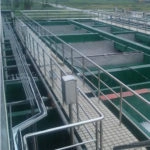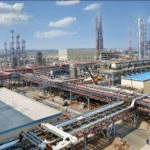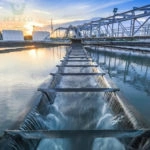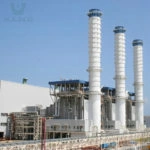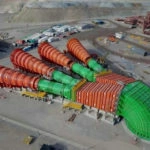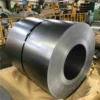What Is Carbon Steel Pipe?
Carbon steel pipe are hollow tubular structures made primarily from carbon and iron, with trace amounts of other elements such as manganese, silicon, and copper. The carbon content in these pipe is what distinguishes them from other types of steel. Carbon steel pipe are known for their exceptional strength, durability, and versatility, making them a preferred choice in various industries and applications.
Different Grades and Types of Carbon Steel pipe
Carbon steel pipe are available in a wide range of grades and types, each offering specific characteristics suitable for different applications. Some common grades of carbon steel pipe include ASTM A53, ASTM A106, API 5L, and ASTM A333. These grades are categorized based on their mechanical properties, such as tensile strength, yield strength, and impact resistance, to meet specific project requirements.
In terms of types, carbon steel pipe can be broadly classified into seamless and welded pipe:
Seamless Carbon Steel pipe
Seamless carbon steel pipe are manufactured without any welded seams, providing a smooth and continuous interior surface. This seamless construction eliminates the risk of weak points and enhances the pipe’s strength and pressure resistance. Seamless pipe are typically produced through a process called hot rolling or cold drawing, where a solid billet is heated and pierced to create a hollow tube.
Welded Carbon Steel pipe
Welded carbon steel pipe are manufactured by joining two or more pieces of carbon steel through various welding processes. The most common welding methods for carbon steel pipe include electric resistance welding (ERW), submerged arc welding (SAW), and high-frequency induction welding (HFI). Welded pipe offer cost advantages and are suitable for applications that do not require high-pressure resistance.
Overview of Manufacturing Processes and Standards
The manufacturing processes of carbon steel pipe vary depending on the type and grade. Here is a general overview of the primary manufacturing methods:
Seamless Pipe Manufacturing
a. Hot Rolling: In this process, a solid billet is heated and passed through a series of rolling mills to produce the desired pipe size and shape.
b. Cold Drawing: In this process, a seamless pipe is created by pulling a solid tube through a die, reducing its diameter and wall thickness while increasing its length.
Welded Pipe Manufacturing
a. Electric Resistance Welding (ERW): This method involves passing an electric current through the edges of two steel plates or coils, heating them and causing them to fuse together.
b. Submerged Arc Welding (SAW): SAW utilizes a granular flux to shield the welding arc and create a fusion between the edges of two steel plates or coils.
c. High-Frequency Induction Welding (HFI): HFI uses high-frequency electrical currents to heat the edges of steel strips and form a welded joint.
Industry standards to ensure quality
ASTM (American Society for Testing and Materials)
API (American Petroleum Institute)
ASME (American Society of Mechanical Engineers)
DIN (Deutsches Institut für Normung)
As trusted carbon steel suppliers, HXSCO ensures that our carbon steel pipe conform to the highest quality standards and meet the specific requirements of your applications. Our comprehensive knowledge of manufacturing processes and industry standards allows us to provide you with reliable and superior products. Whether you need seamless or welded carbon steel pipe, we have the expertise and inventory to fulfill your project needs. Trust HXSCO as your go-to carbon steel supplier, and let us deliver the quality and performance you expect.
Advantages Of Carbon Steel Pipe
Exceptional Strength and Durability for Long-lasting Performance
Carbon steel pipe are renowned for their exceptional strength and durability, making them ideal for applications that require robust and long-lasting performance. The high carbon content in these pipe enhances their tensile strength, allowing them to withstand high-pressure environments. This strength is particularly valuable in industries such as oil and gas, where pipelines must endure extreme conditions. With carbon steel pipe, you can have confidence in the structural integrity and reliability of your infrastructure.
Cost-effectiveness and Value for Money
One of the significant advantages of carbon steel pipe is their cost-effectiveness and value for money. Carbon steel is relatively more affordable compared to other alloys, providing businesses with a cost-efficient solution without compromising quality. The excellent performance-to-price ratio of carbon steel pipe ensures that you get the most value out of your investment. Additionally, the durability of carbon steel pipe minimizes maintenance and replacement costs over their long service life, further contributing to their cost-effectiveness.
Versatility and Customization Options to Meet Specific Requirements
Carbon steel pipe offer exceptional versatility, allowing for customization to meet specific project requirements. With various grades and types available, such as ASTM A53, ASTM A106, and API 5L, carbon steel pipe can be tailored to suit different applications. Whether you need pipe with specific dimensions, wall thicknesses, or surface finishes, carbon steel suppliers like HXSCO can provide the flexibility and customization options you need. This adaptability ensures that your carbon steel pipe perfectly match the demands of your project.
Resistance to Corrosion and Ability to Withstand Harsh Environments
Corrosion can be a significant concern in many industries, but carbon steel pipe exhibit excellent resistance to corrosion. When properly coated or protected, carbon steel pipe can withstand harsh environments, including exposure to chemicals, moisture, and corrosive substances. This resistance to corrosion ensures the longevity and reliability of carbon steel pipe, making them suitable for applications in marine environments, chemical processing, and infrastructure exposed to challenging conditions.
Eco-friendly and Sustainable Manufacturing Process
In an era where sustainability is crucial, carbon steel pipe offer an eco-friendly choice. The manufacturing process of carbon steel pipe typically involves a higher percentage of recycled content compared to other materials. This reduces waste and promotes the efficient use of resources. Choosing carbon steel pipe demonstrates a commitment to environmental responsibility and supports the principles of the circular economy. HXSCO, as a responsible carbon steel supplier, prioritizes sustainability and can provide you with eco-friendly solutions for your piping needs.
As reputable carbon steel suppliers, HXSCO understands the advantages that carbon steel pipe bring to various industries. The exceptional strength, cost-effectiveness, versatility, resistance to corrosion, and eco-friendly manufacturing process make carbon steel pipe a reliable choice for a wide range of applications. Trust HXSCO to deliver high-quality carbon steel pipe that meet your specific requirements, and experience the benefits of this exceptional material in your projects.
Applications Of Carbon Steel Pipe
Construction and Infrastructure Projects
Carbon steel pipe play a vital role in construction and infrastructure projects of all sizes and complexities. These pipe are used for various applications, including water and sewage systems, structural supports, piling, and underground utilities. Their exceptional strength, durability, and resistance to external forces make them ideal for withstanding the demanding conditions often encountered in construction projects. Carbon steel suppliers like HXSCO provide a wide range of carbon steel pipe to meet the specific needs of construction and infrastructure applications.
Oil and Gas Industry
The oil and gas industry heavily relies on carbon steel pipe for exploration, production, and transportation of oil, gas, and other hydrocarbons. Carbon steel pipe are used in drilling operations, oil rigs, pipelines, and refineries. The ability of carbon steel pipe to withstand high pressure, temperature, and corrosive environments makes them indispensable in this industry. Whether for upstream, midstream, or downstream applications, carbon steel pipe from reputable suppliers ensure reliable and safe operations in the oil and gas sector.
Water Transportation and Treatment
Carbon steel pipe are widely used for water transportation and treatment systems. They are used in water mains, distribution networks, and wastewater treatment plants. The corrosion resistance of carbon steel, when properly coated or protected, ensures the safe and efficient conveyance of water. Additionally, carbon steel pipe are suitable for underground installations, providing durability and longevity to water infrastructure projects. Carbon steel suppliers offer a range of pipe sizes and specifications to meet the unique requirements of water transportation and treatment applications.
Industrial and Manufacturing Sectors
The industrial and manufacturing sectors rely on carbon steel pipe for a variety of applications. These pipe are used in factories, power plants, chemical processing plants, and industrial machinery. They are commonly employed for conveying fluids, gases, and steam in industrial processes. Carbon steel pipe provide the necessary strength, reliability, and compatibility with a wide range of substances encountered in industrial operations. Carbon steel suppliers understand the critical role of these pipe in industrial settings and offer high-quality products to ensure seamless operations.
Heating, Ventilation, and Air Conditioning (HVAC) Systems
Carbon steel pipe find extensive use in heating, ventilation, and air conditioning (HVAC) systems. These pipe are used for transporting hot and cold water, steam, and refrigerants in HVAC applications. Carbon steel’s thermal conductivity allows for efficient heat transfer, making it suitable for heating systems. Its corrosion resistance and durability ensure long-lasting performance in challenging HVAC environments. Carbon steel suppliers provide HVAC-grade pipe that meet the stringent requirements of HVAC system installations.
Mechanical and Structural Applications
Carbon steel pipe are widely employed in mechanical and structural applications due to their excellent strength-to-weight ratio and versatility. They are used in the fabrication of equipment, machinery, and structures such as bridges, stadiums, and high-rise buildings. Carbon steel pipe provide the necessary load-bearing capacity and structural integrity required for these applications. Carbon steel suppliers offer a range of pipe sizes, grades, and types to meet the specific mechanical and structural requirements of diverse projects.
Types Of Carbon Steel Pipe
Seamless Carbon Steel pipe
Seamless carbon steel pipe are manufactured without any welded joints, resulting in a continuous and smooth interior surface. These pipe are produced by either hot rolling or cold drawing methods. Hot rolling involves heating a solid billet and passing it through a series of rolling mills to create the desired pipe size and shape. On the other hand, cold drawing involves pulling a seamless pipe through a die to reduce its diameter and increase its length. Seamless carbon steel pipe offer superior strength, reliability, and resistance to high pressure, making them suitable for critical applications in industries such as oil and gas, petrochemicals, and power generation.
Welded Carbon Steel pipe
Welded carbon steel pipe are manufactured by joining two or more carbon steel plates or coils through various welding processes. Welding creates a strong and permanent bond between the steel components, resulting in a robust pipe structure. Welded carbon steel pipe provide cost advantages and are commonly used in applications where high-pressure resistance is not the primary requirement. These pipe are available in different welding methods, each offering specific benefits depending on the application.
ERW (Electric Resistance Welded) Carbon Steel pipe
ERW carbon steel pipe are produced by passing an electric current through the edges of carbon steel plates or coils, heating them to the point of fusion. The heated edges are then pressed together to form a welded joint. ERW pipe are known for their high dimensional accuracy, uniformity, and excellent surface finish. They are commonly used in water supply systems, plumbing, and low-pressure fluid transportation.
LSAW (Longitudinal Submerged Arc Welded) Carbon Steel pipe
LSAW carbon steel pipe are manufactured by forming a J-shaped or C-shaped steel plate or coil into a pipe shape and then welding the edges using the submerged arc welding process. This welding method involves creating an arc between the steel components and a consumable electrode submerged in granular flux. LSAW pipe are widely used in oil and gas transmission pipelines, structural applications, and large-diameter pipe systems due to their high strength and ability to withstand external forces.
SSAW (Spiral Submerged Arc Welded) Carbon Steel pipe
SSAW carbon steel pipe are formed by spirally welding a steel coil or plate to create a helical seam. This welding method, known as the submerged arc welding process, ensures a strong and continuous weld. SSAW pipe have the advantage of being able to produce pipe with larger diameters and thicker walls. They are commonly used in oil and gas transportation, offshore pipelines, and infrastructure projects requiring pipe with high load-bearing capacity.
As reputable carbon steel suppliers, HXSCO offers a wide range of carbon steel pipe in various types to meet the diverse needs of industries and applications. Whether you require seamless pipe for high-pressure environments or welded pipe for cost-effective solutions, our extensive inventory ensures that we can fulfill your specific requirements. Trust HXSCO as your reliable partner for carbon steel pipe, and benefit from our commitment to quality, performance, and customer satisfaction.
Considerations For Selecting Carbon Steel Pipe
Size, Diameter, and Wall Thickness Requirements
When selecting carbon steel pipe, it is crucial to consider the size, diameter, and wall thickness requirements of your project. The size and diameter of the pipe will determine its capacity to transport fluids or handle structural loads. Additionally, the wall thickness affects the pipe’s strength and durability. Carbon steel suppliers like HXSCO provide a range of pipe sizes and thicknesses to meet specific project needs, ensuring optimal performance and efficiency.
Pressure and Temperature Ratings
The pressure and temperature ratings of carbon steel pipe are essential factors to consider. Different applications require pipe capable of withstanding varying levels of pressure and temperature. It is crucial to choose pipe with appropriate ratings to ensure safe and efficient operation. Carbon steel suppliers can provide guidance on selecting pipe that meet the required pressure and temperature specifications for your specific application.
Corrosion Resistance and Protective Coatings
Corrosion resistance is a critical consideration, especially when carbon steel pipe are exposed to corrosive environments. Depending on the application, pipe may require protective coatings or linings to enhance their resistance to corrosion. Carbon steel suppliers offer pipe with various protective coatings, such as epoxy, polyethylene, or zinc coatings, which significantly extend the lifespan of the pipe and maintain their performance in corrosive conditions.
Compliance with Industry Standards and Regulations
Ensuring compliance with industry standards and regulations is of utmost importance when selecting carbon steel pipe. Different industries have specific requirements and standards that must be met to guarantee safety, performance, and compatibility. Carbon steel suppliers that adhere to recognized standards and certifications, such as ASTM, API, and ISO, can provide pipe that meet the necessary quality and regulatory requirements.
Project-Specific Requirements and Certifications
Consideration should be given to project-specific requirements and certifications when selecting carbon steel pipe. Some projects may require specific certifications, such as NACE (National Association of Corrosion Engineers) or PED (Pressure Equipment Directive), depending on the industry or location. It is important to communicate these requirements to your carbon steel supplier to ensure that the pipe provided meet all necessary certifications and specifications.
Working closely with a reliable carbon steel supplier like HXSCO is crucial in considering these factors. Their expertise and experience in the industry allow them to provide valuable guidance and assistance in selecting the right carbon steel pipe for your project. By considering size, diameter, wall thickness, pressure and temperature ratings, corrosion resistance, compliance with standards, and project-specific requirements, you can ensure that the chosen carbon steel pipe meet your specific needs and deliver optimal performance. Trust HXSCO to be your partner in selecting and supplying high-quality carbon steel pipe that meet all your requirements and specifications.
Conclusion
In conclusion, carbon steel pipe offer a multitude of advantages that make them a preferred choice for various applications. As discussed, these pipe provide exceptional strength, durability, and cost-effectiveness, making them a valuable investment for long-lasting performance. Carbon steel suppliers like HXSCO play a crucial role in supplying high-quality carbon steel pipe that meet the specific needs of industries and projects.
When selecting carbon steel pipe, several considerations must be taken into account. The size, diameter, and wall thickness requirements should align with the project’s specifications to ensure optimal functionality. Additionally, pressure and temperature ratings must be carefully evaluated to guarantee safe and efficient operation. Corrosion resistance and protective coatings are vital for applications in corrosive environments, and compliance with industry standards and regulations is essential to meet quality and safety requirements.
By partnering with a reliable carbon steel supplier like HXSCO, you can benefit from our expertise and extensive product range. Our commitment to providing carbon steel pipe that adhere to recognized industry standards ensures the highest quality and performance. Carbon steel suppliers offer a variety of pipe types, including seamless, welded, ERW, LSAW, and SSAW pipe, catering to diverse project requirements.
Whether for construction, oil and gas, water transportation, industrial sectors, HVAC systems, or mechanical and structural applications, carbon steel pipe from trusted suppliers like HXSCO deliver exceptional value and reliability. Our ability to customize solutions based on project-specific needs, certifications, and requirements sets them apart as reliable partners.

